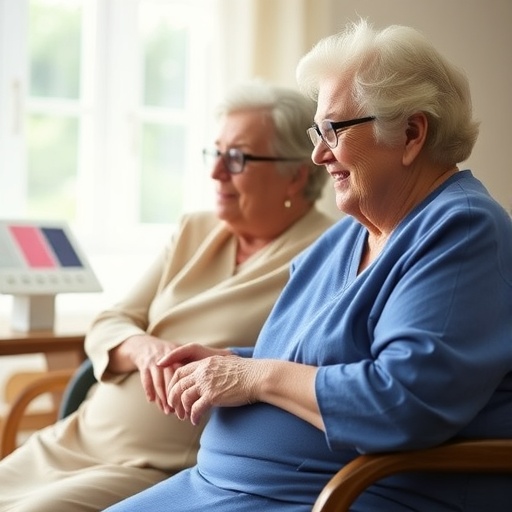In a groundbreaking study poised to reshape the landscape of geriatric oncology, researchers at Ataturk University in Turkey have unveiled compelling evidence linking hope and psychological well-being to improved quality of life in elderly cancer patients. Utilizing advanced statistical methodologies, specifically latent profile analysis (LPA), the investigation delves deep into the intricate psychological profiles that influence the lived experience of this vulnerable population, offering new avenues for therapeutic interventions aimed at enhancing patient resilience and overall wellness.
Cancer remains a formidable adversary globally, with its impact exacerbated in older adults due to comorbidities, physiological decline, and psychosocial stressors. Traditionally, clinical focus has centered predominantly on physical symptoms and biomedical treatment outcomes. However, emerging data emphasize the paramount importance of psychological constructs, such as hope and well-being, in buffering against the debilitating effects of the disease and treatment side effects. This study represents a pivotal step forward by quantifying these intangible factors through sophisticated analytic techniques.
Conducted between September 2024 and January 2025, the study enrolled 398 elderly individuals diagnosed with various forms of cancer. The cohort provided a rich dataset encompassing psychological assessments measuring hope, well-being, and quality of life indices. The application of latent profile analysis, executed via R programming language complemented by tools such as G*Power and SPSS-22, allowed researchers to identify hidden subpopulations within the sample, revealing distinct psychological states that bear significant implications for prognosis and care customization.
The crux of the study’s analytic framework involved evaluating multiple statistical models to determine the best fit for the data structure. The Bayesian Information Criterion (BIC), a cornerstone metric guiding model selection in complex statistics, pointed decisively towards the EEE model as optimal. Following this, the model categorized patients into two latent classes based on their psychological profiles: one class with low psychological status and another with high psychological status. This bifurcation underscores the heterogeneity of psychological experiences among elderly cancer patients and validates the importance of tailored therapeutic strategies.
Notably, the study confirmed that those classified within the low psychological status group exhibited significantly diminished quality of life compared to their counterparts with high psychological status. This finding not only reaffirms the critical role of psychological well-being but also quantifies its impact, providing actionable data that can inform both clinical practice and psychosocial support services. The statistical significance of these outcomes highlights that psychological interventions could be as vital as pharmacological treatments in improving patient trajectories.
Hope, often considered an abstract and subjective experience, emerged as a measurable and modifiable factor influencing quality of life. The research illuminates how fostering hope through psychological counseling, support groups, and integrative therapies can directly elevate patients’ perception of life quality, potentially mitigating symptoms such as depression, anxiety, and social withdrawal. This aligns with a growing body of literature advocating for holistic oncologic care that encompasses mind, body, and spirit.
Furthermore, psychological well-being was found to be a robust predictor of improved patient-reported outcomes. The mechanisms underlying this relationship likely involve neurobiological pathways where positive mental states influence hormonal balances, immune responses, and stress regulation. These biopsychosocial dynamics provide a scientific basis for integrating mental health interventions alongside conventional cancer therapies to achieve synergistic benefits.
The study’s longitudinal aspect, involving data collection over several months, added rigor and depth to understanding temporal changes in psychological status and their correlation with quality of life fluctuations. This temporal perspective is crucial as it captures the ebb and flow of patients’ mental health as they navigate diagnosis, treatment, and survivorship or palliative care, presenting opportunities for timely psychological support that adapts to patient needs.
Clinicians and caregivers can harness these insights to develop predictive models for identifying patients at risk of psychological decline and consequent quality of life deterioration. Such models pave the way for personalized medicine approaches where intervention intensity and modalities are matched to individual psychological profiles, maximizing effectiveness while optimizing resource allocation.
The implications of this research are profound for health policy makers and healthcare systems striving to optimize oncology care for the aging population. By highlighting the indispensable role of psychological health, the study advocates for the allocation of resources towards mental health services, training healthcare providers in psychosocial oncology, and embedding psychological assessments routinely within oncological care pathways.
Critically, the research underscores the importance of interdisciplinary collaboration, bridging oncology, psychology, geriatrics, and biostatistics. This integrative approach is necessary to unravel the complex interactions between aging, cancer biology, and mental health, ultimately fostering innovations that enhance both longevity and quality of life.
The authors advocate for future longitudinal studies to extend these findings, particularly to explore causal pathways and intervention efficacy over longer durations. Such studies would enable the refinement of psychological support protocols and contribute substantially to evidence-based guidelines for managing elderly cancer patients holistically.
In summary, this seminal investigation elucidates that hope and psychological well-being are not merely ancillary concerns but central determinants of quality of life among elderly cancer patients. By harnessing latent profile analysis, the research offers a nuanced understanding of patient heterogeneity, pointing towards personalized, psychologically informed care paradigms that promise to revolutionize geriatric oncology outcomes.
The scientific community, clinicians, patients, and caregivers alike stand to benefit from these insights, which reaffirm that fostering mental resilience and hope can be as critical as any medical treatment in the battle against cancer’s multifaceted challenges.
Subject of Research: The investigation focuses on how psychological constructs—hope and psychological well-being—affect the quality of life among elderly cancer patients, analyzed using advanced latent profile analysis methods.
Article Title: The effect of hope and psychological well-being on quality of life in elderly cancer patients: latent profile analysis
Article References:
Aydın, M.A., Kizilarslan, V., Emrem, M. et al. The effect of hope and psychological well-being on quality of life in elderly cancer patients: latent profile analysis. BMC Cancer (2025). https://doi.org/10.1186/s12885-025-15270-x
Image Credits: Scienmag.com
DOI: https://doi.org/10.1186/s12885-025-15270-x




